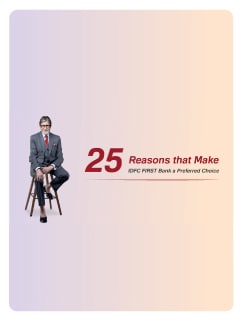CKYC Registry
-
Customer Service Contact us Service request Locate a branch
Find all the help you need
Scan the QR, get our app, and find help on your fingertips

Help CenterSupport topics, Contact us, FAQs and more
-
Login
Are you ready for an upgrade?
Login to the new experience with best features and services
-
Login
Are you ready for an upgrade?
Login to the new experience with best features and services
- Accounts
-
Deposits
IDFC FIRST Bank Deposits
View all Deposits -
Loans
IDFC FIRST Bank Loans
View all Loans - Wealth & Insure
-
Payments
IDFC FIRST Bank Payments
View all Payments -
Cards
IDFC FIRST Bank Cards
View all Cards - Blogs
- Corporate Account
-
Cash Management Services
IDFC FIRST Bank Cash Management Services
View all Cash Management Services - Supply Chain Finance
-
Corporate Lending
IDFC FIRST Bank Lending
View all -
Treasury
IDFC FIRST Bank Treasury
See more details - NBFC Financing
Support topics, Contact us, FAQs and more
- IDFC FIRST Bank Accounts
-
Savings Account
-
Corporate Salary
Account -
Senior Citizens
Savings Account -
First Power
Account -
Current Account
-
NRI Savings
Account -
TASC Institutional
Account -
Savings Account
Interest Calculator
- IDFC FIRST Bank Deposits
-
Fixed Deposit
-
Recurring Deposit
-
NRI Fixed Deposit
-
Safe Deposit Locker
-
FD Calculator
-
RD Calculator
- IDFC FIRST Bank Loans
-
Personal Loan
-
Consumer Durable
Loan -
Home Loan
-
Business Loan
-
Professional Loan
-
Education Loan
-
New Car Loan
-
Pre-owned Car Loan
-
Two Wheeler Loan
-
Pre-owned Two
Wheeler Loan -
Commercial Vehicle
Loan -
Gold Loan
-
Loan Against Property
-
Loan Against Securities
-
Easy Buy EMI card
-
Personal Loan
EMI Calculator -
Education Loan
EMI Calculator -
Home Loan
EMI Calculator
- IDFC FIRST Bank Wealth & Insure
-
FIRST Select
-
FIRST Wealth
-
FIRST Private
-
Mutual Funds
-
Sovereign Gold Bond
-
Demat Account
-
Term Insurance
-
Life Insurance
-
Health Insurance
-
General Insurance
-
Bonds
-
Loan Against
Securities -
Portfolio Management
Service
- IDFC FIRST Bank Payments
-
FASTag
-
Credit Card
Bill Payments -
UPI
-
Funds Transfer
-
Forex Services
-
Pay Loan EMI
- IDFC FIRST Bank Cards
-
Ashva :
Metal Credit Card -
Mayura :
Metal Credit Card -
FIRST Millennia
Credit Card -
FIRST Classic
Credit Card -
FIRST Select
Credit Card -
FIRST Wealth
Credit Card -
FIRST WOW!
Credit Card -
Deals
-
Debit Cards
-
Co-branded Cards
-
Credit Card
EMI Calculator -
FIRST Corporate
Credit Card -
FIRST Purchase
Credit Card -
FIRST Business
Credit Card
- Premium Metal Credit Cards
-
AshvaLifestyle1% Forex₹2,999
-
MayuraLifestyleZero Forex₹5,999
-
FIRST PrivateInvite Only
- Best for travellers
-
MayuraZero ForexMetal₹5,999
-
Ashva1% ForexMetal₹2,999
-
FIRST WOW!Zero ForexTravelLifetime Free
-
FIRST SWYPTravel OffersEMI₹499
-
FIRST Select1.99% ForexLifestyleLifetime Free
-
FIRST Wealth1.5% ForexLifestyleLifetime Free
-
Club VistaraTravelLifestyle₹4,999
-
IndiGo IDFC FIRST Dual Credit CardTravelLifestyle₹4,999
- Max benefits, Free for life
-
FIRST Classic10X RewardsShoppingNever Expiring Rewards
-
FIRST Millennia10X RewardsShoppingNever Expiring Rewards
-
FIRST Select10X RewardsLifestyle1.99% Forex
-
FIRST Wealth10X RewardsLifestyle1.5% Forex
-
FIRST WOW!RewardsTravelZero Forex
-
LIC ClassicRewardsInsuranceShopping
-
LIC SelectRewardsInsuranceShopping
- Reward Multipliers
-
AshvaLifestyleMetal₹2,999
-
MayuraLifestyleZero Forex₹5,999
-
FIRST ClassicNever Expiring RewardsShoppingLifetime Free
-
FIRST MillenniaNever Expiring RewardsShoppingLifetime Free
-
FIRST SelectNever Expiring RewardsLifestyleLifetime Free
-
FIRST WealthNever Expiring RewardsLifestyleLifetime Free
- Rewards & Credit on UPI
-
FIRST Power+FuelUPI₹499
-
FIRST PowerFuelUPI₹199
-
FIRST EA₹NVirtual1% Cashback₹499
-
FIRST DigitalVirtualUPI₹199
-
IndiGo IDFC FIRST Dual Credit CardUPITravelDual cards
- Fuel and Savings
-
FIRST PowerRewardsUPI₹199
-
FIRST Power+RewardsUPI₹499
-
LIC ClassicRewardsInsuranceShopping
-
LIC SelectRewardsInsuranceShopping
- Express and Flaunt
-
AshvaMetal1% Forex₹2,999
-
MayuraMetalZero Forex₹5,999
-
FIRST SWYPEMIOfferMAX₹499
-
FIRST MillenniaRewardsShoppingLifetime Free
- FD Backed rewarding Credit Cards for all
-
FIRST EA₹NVirtualCashback₹499
-
FIRST WOW!Zero ForexTravelLifetime Free
-
CreditPro Balance TransferTransfer & SaveReduce InterestPay Smartly
- IDFC FIRST Bank NRI Forex Solutions
-
Send money to India-Wire transfer
-
Send money to India-Digitally
-
Send money abroad
-
Max Returns FD (INR)
- IDFC FIRST Bank MSME Accounts
-
Platinum Current
Account -
Gold
Current Account -
Silver Plus
Current Account -
Merchant Multiplier
Account -
Agri Multiplier
Account -
TASC Institutional
Account -
Dynamic Current
Account -
World business
Account -
First Startup
Current Account
- IDFC FIRST Bank Business Loans
-
Business Loan
-
Professional Loan
-
Loan Against Property
-
Business Loan for Women
-
Working Capital Loan
-
Construction Equipment Loan
-
Machinery Loan
-
Healthcare Equipment Loan
- IDFC FIRST Bank Business Solutions
-
Payment Solutions
-
Tax Payments
-
Doorstep Banking
-
Point of Sale (POS)
-
Escrow Accounts
-
NACH
-
Payment Gateway
-
UPI
-
Virtual Accounts
-
As per amendment in the Income Tax Rules, PAN or Aadhaar are to be mandatorily quoted for cash deposit or withdrawal aggregating to Rupees twenty lakhs or more in a FY. Please update your PAN or Aadhaar. Kindly reach out to the Bank’s contact center on 1800 10 888 or visit the nearest IDFC FIRST Bank branch for further queries.
-
-
Most Searched
Sorry!
We couldn’t find ‘’ in our website
Here is what you can do :
- Try checking the spelling and search
- Search from below suggestions instead
- Widen your search & try a more generic keyword
Suggested
Get a Credit Card
Enjoy Zero Charges on All Commonly Used Savings Account Services
Open Account Now
Choosing the right bank account is crucial for navigating your financial journey in the intricate world of personal finance. To meet the varied needs of individuals, financial institutions offer a variety of bank accounts. We at IDFC FIRST Bank understand the importance of bank accounts and provide you with unique features that can help you grow financially. Let's take a look at the significance of bank accounts, explore the types available, and help you choose wisely.
Here, you will find a step-by-step guide to help you in your retirement planning. You will also learn about the best retirement plans in India, where you can invest your money.
READ MORE
Types of bank accounts
Different customers have different banking needs, and a single bank account may not adequately serve them all. Hence, banks offer a variety of accounts according to your requirements and financial goals. IDFC FIRST Bank offers the following broad categories of individual bank accounts.
1. Savings account
The most common type of bank account is a savings account. Your savings account is designed to meet your everyday banking needs, including saving money and making transactions. In addition to earning interest on your funds, IDFC FIRST Bank Savings Accounts allow you to access your funds easily, while growing them. For faster financial growth, IDFC FIRST Bank Savings Accounts offer one of the highest interest rates in the industry and monthly interest credits.
2. Current account
In addition to offering unlimited transactions and overdrafts, a current account is ideal for individuals who make frequent payments and withdrawals. A current account is also useful for managing cash flow and expenses. Most current accounts have additional features such as online and mobile banking, as well as the ability to set up direct debits and standing orders.
3. Fixed deposit account
If you are looking for a safe investment option with guaranteed returns, consider a fixed deposit account. Your money is locked in for a specific period, and you receive higher interest rates than with a savings account. IDFC FIRST Bank offers high-interest rates and flexible tenures to grow your idle funds rapidly.
4. Recurring deposit account
Recurring deposit accounts are a good choice for people who want to maintain a regular saving habit. You deposit a fixed amount every month, and over time, it accumulates interest higher than with a savings account.
5. NRI account
Non-resident Indians (NRIs) can open NRI accounts to manage their finances in India. These accounts come in different variants, such as NRE (Non-Residential External) and NRO (Non-Residential Ordinary), each with unique benefits.
6. Salary account
Salary accounts are often offered by employers to their employees so that their salaries can be disbursed easily. Usually, these accounts come with perks such as no balance requirement and discounts on a variety of services.
Choose from a wide range of IDFC FIRST Bank Accounts that suit your financial needs and enjoy a hassle-free banking experience.
How to choose the right account for you?
Selecting the right type of bank account depends on your financial goals, lifestyle, and preferences. Here's a step-by-step guide to help you make an informed decision:
1. Assess your needs:
Determine your primary reasons for opening an account. Are you saving for a specific goal, managing daily expenses, or investing for the long term?
2. Consider your lifestyle:
If you have a busy lifestyle with frequent transactions, a current account might be more suitable. Conversely, if you want to save and earn interest, a savings or fixed deposit account may be better.
3. Evaluate fees and charges:
Different bank accounts come with various fees and charges. Ensure you understand these, including maintenance fees, ATM charges, and penalties for non-compliance.
4. Interest rates:
If you are keen on growing your savings, compare interest rates offered by different account types. Fixed deposits typically offer higher interest rates, but have a lock-in period.
5. Access to services:
Consider the additional services offered with your account, such as a debit card, internet banking, and mobile apps. These can greatly enhance your banking experience.
6. Bank reputation:
Choose a reputable bank like IDFC FIRST Bank, known for its customer-centricity, robust security, and wide range of banking solutions.
Why do you need a bank account?
An account is more than a financial tool; it is a cornerstone of modern financial management. There are several reasons why you should open a bank account:
1. Safety and security:
Keeping your hard-earned money under your mattress might seem easy, but it lacks the safety net banks provide. Banks have robust security measures to protect your funds from theft or natural disasters.
2. Convenience:
Imagine paying bills, receiving salary, or shopping online without handling physical cash. A bank account simplifies daily transactions, making your life smoother and hassle-free.
3. Interest earnings:
Many types of bank accounts offer interest on your deposits, helping your money grow over time. It's like having a partner in wealth creation.
4. Financial records:
Bank statements record your financial transactions. They are essential when applying for loans or filing taxes.
5. Access to financial services:
A bank account is your gateway to various financial services, including loans, credit cards, and investment opportunities.
Different types of bank accounts cater to diverse financial needs. Whether you're looking for a secure place to save, easy access to funds, or opportunities to grow your wealth, there's a bank account tailored for you.
IDFC FIRST Bank is committed to helping you make the right choice. So, take the first step towards financial security and growth by opening an account that aligns with your aspirations and lifestyle. Explore the world of banking with us and experience the convenience and benefits of a bank account. Start your journey today!
Disclaimer
The contents of this article/infographic/picture/video are meant solely for information purposes. The contents are generic in nature and for informational purposes only. It is not a substitute for specific advice in your own circumstances. The information is subject to updation, completion, revision, verification and amendment and the same may change materially. The information is not intended for distribution or use by any person in any jurisdiction where such distribution or use would be contrary to law or regulation or would subject IDFC FIRST Bank or its affiliates to any licensing or registration requirements. IDFC FIRST Bank shall not be responsible for any direct/indirect loss or liability incurred by the reader for taking any financial decisions based on the contents and information mentioned. Please consult your financial advisor before making any financial decision.
The features, benefits and offers mentioned in the article are applicable as on the day of publication of this blog and is subject to change without notice. The contents herein are also subject to other product specific terms and conditions and any third party terms and conditions, as applicable. Please refer our website www.idfcfirstbank.com for latest updates.






















